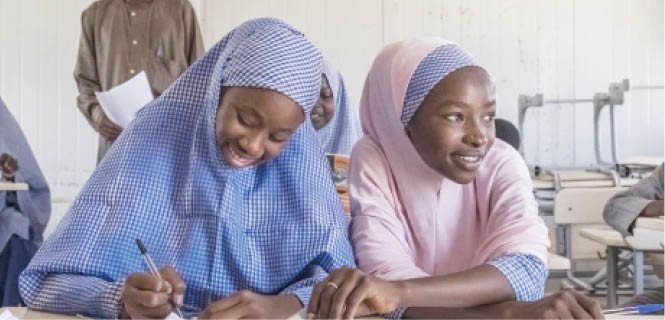‘Women should be seen as humans with right to education’
Nigeria is expected to experience a major demographic transition from 202 million in 2019 to 410 million in 2050 constituting three percent of the world and 14 percent of Africa’s population, according to the Nigerian Economic Summit Group (NESG). How the demographic realities can be transformed into social and business opportunities was the topic of […]

Nigeria is expected to experience a major demographic transition from 202 million in 2019 to 410 million in 2050 constituting three percent of the world and 14 percent of Africa’s population, according to the Nigerian Economic Summit Group (NESG).
How the demographic realities can be transformed into social and business opportunities was the topic of discussion at the second plenary at the NES25 with theme ‘Nigeria 2050: Shifting Gears’.
The panelists were HRH Muhammadu Sanusi II, Bishop Matthew Hassan Kukah, Chairman of Nigerian Governors Forum Dr Kayode Fayemi, and CEO of Jumia Nigeria, Mrs Juliet Anammah.
Emir Sanusi during his submission said government has not provided education but was telling parents to take their children to school. He also said the population problem was perhaps the most important development challenge facing the country, adding that an economic transition can only happen if there is a demographic transition.
“We need to have greater nuance in looking at population and demography because Nigeria is one country but it is many countries in many respects. Fertility rates in some parts of the country is like eight children per woman and in other parts they are three and it is extremely important to understand that,” he said.
He said parts of the country have huge variations in fertility rates determined by education, such that girls who have not completed secondary school or women who do not have secondary education tend to have more children on the average than those who have gone through education.
He also said the perceived population growth of over 3 percent is mostly coming from the Northwest and Northeast, adding “that is where we have the highest fertility rate and that is where we have the highest number of girls who have not had an education and also where we have the highest level of poverty.”
“So to address population growth, the single most important mindset change we need to have is to see women as human beings with rights to education, healthcare, rights to protection against violence, against arbitrary divorce and abuse and rights to earning an income.
“So long as they are seen as baby factories so they can be married and have children, we are going to have these challenges,” the emir said.
Bishop Kukah while speaking, wondered why “everything that provides an opportunity becomes a liability in Nigeria?” adding, “How is it that a country that is so resource endowed with all the opportunities available to use becomes a liability?”
He added that it is past time for Nigeria to learn from other countries how they turn their population into something positive.
He urged government to make the country sufficiently livable so the amount of manpower that the country possesses may be efficiently utilized.
Governor Fayemi said the Child Rights Act is one that already exists in Nigeria but the challenge is to what extent at the state and federal levels is the enforcement.
He said the provisions of the act talk about access to education, and compulsory attendance at school. He also stated that all children of school age must be in school and if they are not the parents have a lot of explaining to do.
Speaking from the private sector point of view, Mrs Anammah advocated for core skills and more provisions to enable unemployed graduates connect those skills to create opportunities for themselves.
